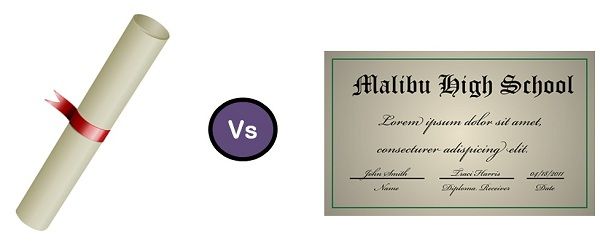 Generally, a degree course is offered by an autonomous college or university, whereas a diploma programme is provided by the educational institutions and even by colleges. In general, a degree course is completed in 3-4 years. On the contrary, a diploma course requires 1-2 years for completion.
Generally, a degree course is offered by an autonomous college or university, whereas a diploma programme is provided by the educational institutions and even by colleges. In general, a degree course is completed in 3-4 years. On the contrary, a diploma course requires 1-2 years for completion.
Education not only lets us understand the difference between what is right and wrong, but also eradicates illiteracy, removes myths and superstitions, makes a person confident. So, it’s not all about getting literate, but getting fully educated about our society, field, and technology. After clearing Senior Secondary Examination, there are two options open to a person, i.e. either pursue a degree or a diploma course.
The diploma and degree courses are not only associated with bachelor’s program, rather at the postgraduate, master’s and associate level too. So, one needs to understand the difference between degree and diploma course completely, before going for any of these two.
Content: Degree Vs Diploma
Comparison Chart
| Basis for Comparison | Degree | Diploma |
|---|---|---|
| Meaning | A degree is a certificate awarded by the college or university on the successful completion of studies at a particular level in a stream opted by him. | A diploma is a certificate issued by the educational institution to the student for pursuing a particular course from the institution and passing the examination afterwards. |
| Pay Scale at the time of employment | Higher | Comparatively low |
| Flexible | Yes | No |
| Time Horizon | 3-4 years | 1-2 years |
| Minimum qualification | Higher Secondary | High School |
| Depth of Knowledge | More | Comparatively Less |
| Conducted by | Universities | Universities / Educational Institutes |
| Admissions | Annually | Semiannually |
| Fees | More | Less |
Definition of Degree
A certificate given to the student by the recognized university or college for the successful completion of his studies in a stream at a particular level is known as Degree. The student can pursue the degree courses after passing the higher secondary examination. The degrees are awarded to the students in the convocation ceremony, organized by the university or college. There are four major types of degrees, they are:
- Associate Degree
- Bachelor Degree
- Master Degree
- Doctorate Degree
The student gets an in-depth knowledge of the particular stream chosen by him. The period of a degree program varies from 3 to 4 years. Besides the theoretical knowledge, the student has to go for an internship having a duration of 3-6 months. The significant benefit in pursuing a degree course is that the students get jobs easily in a short span of time. The curriculum of the degree course mainly focuses on the specialisation chosen by the student. Some examples of Degree Courses are B. Com, B.Sc, MBA, B.E., B. Tech, B.A. M.E., M. Tech. etc.
Definition of Diploma
A certificate given to the student by a recognised university or an educational institution, for the successful completion of a course of study, is known as Diploma. The admission to diploma course can be taken after clearing high school examination. There are two major types of diploma, they are:
- Graduate Diploma
- Post Graduate Diploma
While pursuing a diploma course, he gets a thorough knowledge of the particular course opted by him. The period of the course may vary from 1 to 2 years. The primary benefit of pursuing a diploma course is that it takes less time and money. Moreover, the curriculum of a diploma course is framed in such a way that the students get more practical knowledge on the particular course. In this way, the skills are developed in them automatically. Some examples of Diploma courses are DCA, PGDCA, PGUDPL, PDGM, etc.
Key Differences Between Degree and Diploma
The points given below explain the significant differences between degree and diploma:
- The degree is a certificate given to the student by the university for the successful completion of his studies, up to a particular stage in a stream chosen by him. The diploma is a certificate, awarded to the student by the educational institution for pursuing and accomplishing a particular course successfully.
- Admissions to a degree program are made yearly. Conversely, admissions in a diploma course are done either on yearly or half-yearly basis depending on the policies of the university or an institution.
- Degree courses are usually more expensive as compared to the diploma courses.
- Degree courses consumes more time than diploma courses.
- Some degree courses are flexible i.e. student may change the stream within a few months of admission. On the other hand, in diploma, there is no such option.
- Least qualification for taking admission to a degree program is 10+2, but in the case of diploma, it is 10th.
- Normally, degree holders are paid higher than the diploma holders.
- The types of degrees are bachelor, master, associate and doctorate. The type of diplomas is graduate or post graduate.
Video: Degree Vs Diploma
Conclusion
Nowadays people are much more concerned about their higher education. Choosing between degree and diploma is a very tough task, both have their merits and demerits.






John Smith says
DEGREE is the best between Degree and Diploma.
MBA distance education says
A degree is an advanced education option where you pick an area of study to be your major.
Mbali says
Hi
If im doing my MBA as HCBM -4 were do I fall?am I a diploma or degree MBA im confused.if I want to do masters in MBA how many more years do I need to study.